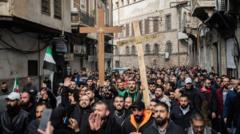A wave of protests has swept across Syria, ignited by the recent burning of a Christmas tree in Suqaylabiyah, a town predominantly inhabited by Christians. The incident, which has been widely shared on social media, shows a video of the tree engulfed in flames, allegedly torched by foreign fighters leading to severe backlash from the local community.
Hayat Tahrir al-Sham (HTS), the leading Islamist faction in the region, has since taken action, detaining several foreign individuals linked to the arson. HTS officials have responded to the turmoil by affirming their commitment to safeguarding the religious and ethnic rights of minorities in the nation.
Amateur footage circulating online depicted masked assailants pouring an unidentified substance onto the Christmas tree hours before the Christian community was set to celebrate Christmas Eve, raising questions about the motivations behind the act. In response, a representative from HTS made a public promise that the tree would be restored by the morning, taking an unusual stance by holding up a Christian cross as a demonstration of solidarity.
Protests intensified, with crowds taking to the streets of Damascus. Members of various neighborhoods rallied against the presence of foreign fighters, chanting slogans like "Syria is free, non-Syrians should leave." Demonstrators in other areas carried crosses alongside Syrian flags, with one protester, Georges, stating, "If we're not allowed to live our Christian faith in our country, as we used to, then we don't belong here anymore."
Syria is a nation rich in diverse cultures and ethnicities, housing Kurds, Armenians, Assyrians, Druze, and various Muslim sects. The nation is witnessing schisms as it emerges from over half a century of Assad family rule, with over 25,000 displaced individuals returning home since the recent government transition.
Despite HTS's previous jihadist affiliations, the group has attempted to pivot toward a more inclusive governance model, advocating for a unified Syria that accommodates all factions. However, the group's credibility remains under scrutiny, particularly given its designation as a terrorist entity by several foreign governments.
The new authorities have signaled plans to integrate various military factions under a restructured Ministry of Defense, yet details about which groups will participate remain vague. As external powers navigate the complexities arising from the changing political landscape, including the US's recent withdrawal of a bounty on HTS's top leader, the newly formed regime faces significant challenges, notably the need to restore stability and address the insecurities posed by both foreign fighters and extremist elements within the country.
As the protests unfold and citizens demand assurance regarding their safety and rights, it remains to be seen how HTS will balance these expectations against its past and its future vision for Syria.
Hayat Tahrir al-Sham (HTS), the leading Islamist faction in the region, has since taken action, detaining several foreign individuals linked to the arson. HTS officials have responded to the turmoil by affirming their commitment to safeguarding the religious and ethnic rights of minorities in the nation.
Amateur footage circulating online depicted masked assailants pouring an unidentified substance onto the Christmas tree hours before the Christian community was set to celebrate Christmas Eve, raising questions about the motivations behind the act. In response, a representative from HTS made a public promise that the tree would be restored by the morning, taking an unusual stance by holding up a Christian cross as a demonstration of solidarity.
Protests intensified, with crowds taking to the streets of Damascus. Members of various neighborhoods rallied against the presence of foreign fighters, chanting slogans like "Syria is free, non-Syrians should leave." Demonstrators in other areas carried crosses alongside Syrian flags, with one protester, Georges, stating, "If we're not allowed to live our Christian faith in our country, as we used to, then we don't belong here anymore."
Syria is a nation rich in diverse cultures and ethnicities, housing Kurds, Armenians, Assyrians, Druze, and various Muslim sects. The nation is witnessing schisms as it emerges from over half a century of Assad family rule, with over 25,000 displaced individuals returning home since the recent government transition.
Despite HTS's previous jihadist affiliations, the group has attempted to pivot toward a more inclusive governance model, advocating for a unified Syria that accommodates all factions. However, the group's credibility remains under scrutiny, particularly given its designation as a terrorist entity by several foreign governments.
The new authorities have signaled plans to integrate various military factions under a restructured Ministry of Defense, yet details about which groups will participate remain vague. As external powers navigate the complexities arising from the changing political landscape, including the US's recent withdrawal of a bounty on HTS's top leader, the newly formed regime faces significant challenges, notably the need to restore stability and address the insecurities posed by both foreign fighters and extremist elements within the country.
As the protests unfold and citizens demand assurance regarding their safety and rights, it remains to be seen how HTS will balance these expectations against its past and its future vision for Syria.


















